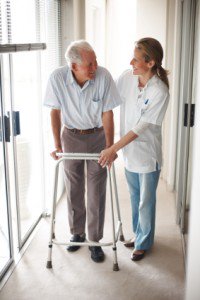When elderly people can no longer care for themselves in their own homes, in-home care can allow them to stay at home. Whether home is a private home or a retirement setting, in-home care services can provide the compassionate care that makes it possible for seniors to live safely and comfortably. Services fall into two general categories: medical home care services and non-medical support services.
Medical In-Home Care Services
Home health agencies provide skilled nursing care and therapies according to a doctor’s care plan. The licensed professionals who provide care may be home health aides, licensed or practical nurses, physical or occupational therapists, or certified nurse aides. These health care providers work as a team under the agency’s medical oversight and supervision.
Depending on their levels of training and certification, certified nurse aides and home health aides may perform wound care, catheter care, health monitoring, and related bedside services. Training and certification requirements may vary depending on state and local rules.
The length of time medical caregivers provide services is based on the doctor’s assessment and may be short-term or ongoing.
Non-medical Support Services
Personal care aides assist elderly people with daily tasks, enabling seniors who need practical help but not ongoing medical care to remain independent. Non-medical aides may provide services short term—after an illness or injury, for example—or long term. They may work for a client a few hours a day, a few days a week, or round-the-clock.
The services personal aides provide vary from one client to another. Aides may do food shopping or meal preparation, run errands, take clients to medical and other appointments, do housekeeping, or help with bathing and dressing. They may remind seniors to take their medications, get exercise, or eat their meals.
In addition to the specific tasks they perform, non-medical caregivers offer companionship to their clients and a breather for family caregivers.
Non-medical caregivers may work independently or through an agency. Agency caregivers cost more, but there are advantages: Reputable agencies are bonded and insured as well as licensed per state regulations. Agency caregivers typically pass background tests, are supervised, and are covered by workers’ compensation. Plus, it may be easier for agencies to provide qualified replacements if needed. If you go with this option, having a medical alert device can give additional peace of mind at home. Consider the Life Alert costs when creating your plan.
Benefits of In-Home Care
Most senior say they want to remain in their own homes as long as possible. With in-home care, seniors get the help they need to maintain their dignity, independence, and well-being in the comfort and familiarity of home.
Do you have a loved one that has chosen in-home care? Let us know in the comments below.



